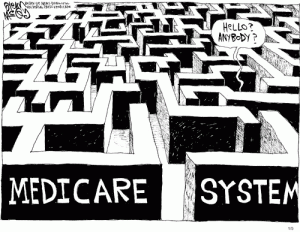By Susan Saldibar
“No need to worry about compliance, we’re fine, it’s a new construction site.” Or so they said to Greg Proctor recently. Greg is VP of Business Development for RealPage Compliance Services, a division of RealPage (a Senior Living Foresight partner). The topic of conversation was ADA compliance and what’s interesting about this particular situation is that the RealPage Compliance guys drove by the “new construction site” and, without even getting out of the car, saw that the recently completed building was already out of compliance. Oh snap.
I guess they could just blame it on the architect. But that doesn’t change the fact that when you’re out of compliance you’re facing fixes that could be inexpensive to do now, but very expensive to fix after they’re found by an auditor or, worse yet, exposed in a lawsuit.
Are Communities Just Ticking Bombs?
I caught up with Greg recently and asked him to give me a quick update on where today’s senior living communities are regarding compliance. According to Greg, the real problems haven’t changed much. “It’s not an issue of new regulations and changes to existing ones,” he says. “It’s an issue of knowing whether or not you’re in compliance with existing regulations.” Apparently, in many cases, operators mistakenly think they are already in compliance. For others, with so much already on their plates, compliance reviews end up on the back burner, with fingers crossed that an issue never comes up.
And, yet, the likelihood of an issue “coming up” is pretty high. Because in all his years of doing inspections (numbering thousands) Greg has never found one building that is totally compliant. So, are communities just ticking bombs for compliance lawsuits? What if someone slips and falls due to an incorrect curb cut in the walkway? What if someone in a wheelchair can’t reach a light switch placed too high in your lobby bathroom?
Cheaper Now Than Later
It is that tendency to put off conducting compliance reviews and making the necessary adjustments that Greg says can create trouble downstream. I asked him how much does it actually cost a non-compliant community to get back into compliance? Turns out it’s a heck of a lot cheaper to fix this stuff now than after someone tells you that you have to. Greg shared this sample from an existing spreadsheet for a community:
Realizing that these may not all apply to your property, this is a pretty compelling illustration as to why you should do these adjustments before you end up in a lawsuit. My guess is that $5,100 probably wouldn’t even cover a couple days’ worth of attorney fees.
But it’s also important, once you have a plan in place, to update it every two to three years, Greg tells me. Because, if you do get sued and go to court, the attorney for the plaintiff will probably ask if you have ever had an accessibility plan completed. If so, they’ll want to know why it isn’t up to date. “That’s what I tell operators who don’t keep their compliance documents up to date,” Greg says. “I’ll say, ‘Hey, you don’t want your outdated plan to be Exhibit A in a lawsuit by a plaintiff!’”
You Can Do This Yourself, But You May Not Want To
I asked Greg what operators can do to begin the process of getting their properties back into compliance. “Actually, operators can do a lot of this work themselves,” he tells me. “HUD required a self-evaluation and transition plan be completed for their properties over thirty years ago.” RealPage also has created a really useful ebook that looks at both ADA and FHA compliance requirements. It even has a checklist at the back to make sure you’re tackling all the areas you need to. So, there’s help out there for those who are ready to get it.
But Greg also acknowledges that there is knowledge needed to understand what laws apply and what ones don’t. And some of this may lie outside the owner’s expertise. That’s where an independent third party, like RealPage, can come out and do a thorough evaluation.
The ebook on ADA and FHA compliance is a must-read. Take a minute to download it and check it out. You can also learn more about RealPage Accessibility Plans and Inspection Services here.








